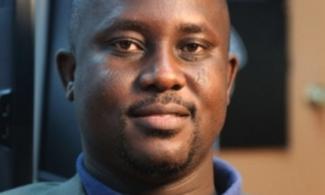
In my living room, over pepper soup, during the years I spent as an Assistant Professor of Comparative Literature at Penn State University in the United States, Chika Okeke-Agulu, my good friend and Princeton University Professor of African Art History, also an Assistant Professor at Penn State at the time, would moan and lament the condition of Nigeria. Wherever two or more Nigerians are gathered in the diaspora, dissatisfaction with the state of affairs in Nigeria is usually the top subject of conversation and, in most cases, the only one.

Compulsive pity party about Nigeria is such a marker of diasporic Nigerian identity that even folks who haven’t been home since Akintola parted ways with Awolowo will make an effort to join the conversation, telling you how bad things are now “in the Western region” or wondering why the roads are so bad under the current Premier of the Eastern region, whoever he may be!
One Nigerian pity party zinger from Professor Chika Okeke-Agulu, circa 2005, has stayed with me ever since he uttered it. We were talking about American infrastructure and how things worked and how far ahead of Nigeria America is, bla, bla, and bla. I sipped beer, dealt with a piece of oxtail in the pepper soup, and volunteered the usual Nigerian consolation:
“Anyway sha, Chika, Nigeria will get there some day.”
“Na wetin dey fear me be dat,” Chika replies, “By the time Nigeria gets to this level of development and advancement, if we ever do, these people would all have relocated to Mars and be collecting earth rent from us.”
By “these people”, he meant Euro-America. It is true that the level of infrastructural, technological, democratic, and civic advancement in obodo oyibo often leaves one breathless and in despair. And the self-doubt that we may never get to this level or that we may reach this level and discover that the West has moved on the Mars, leaving us instructions on where to pay rent on earth, is quite legitimate and one must not mistake it for fatalism.
In a series of public reflections I have done since October 1, 2015, I have dismissed the usual excuses and alibis that the Nigerian mobilizes to console and deceive himself and rationalize the mediocrity and abject backwardness of his country: we are different; we have tribalism and corruption; Rome was not built in a day; it took America and Western Europe over 200 years to get there; bla here, bla there, bla yonder.
If you are coming to this treatise to reason along these otiose and unhelpful lines, you better just yinmu and pass: I have no time to rehash why these alibis are not valid in 2015 or to repeat that America and Western Europe also have the same problems of corruption, ethnicity (plus racism fa), and bitter political divisions that you are mobilizing to justify Nigeria’s backwardness.
The one thing they have over us is the insistence by the majority most of the time to reject mediocrity about themselves and their respective countries in the Western world. The instinct here is to reject mediocrity, never to accept or justify or rationalize or excuse it, never to let it define them. I am a student of this instinct in the Westerner never to accept mediocrity or justify it or excuse it in any way, shape or form. It always amazes me.
The Westerner goes to the restroom in a pub or in any facility, one light bulb is dead or one tap is not functioning properly, that instinct to reject mediocrity kicks in. He is going to raise hell and ensure that something is done. It is just not acceptable that a light bulb is not working. The proper functioning of everything that is public is considered personal. They take it personal like say na dem Papa property. Put a Nigerian in the same facility in Nigeria and the excuses and rationalizations and justifications will nearly choke you:
“Eeyah! Maybe dem no get money to buy bulb. You know say country hard.”
In Canada, they take this personalization of the rejection of mediocrity to insane levels. If you litter in a public space, you don’t have to worry about the authorities who will fine you if they catch you. That is the least of your problems. Your real problem is the ordinary
Canadian passerby who will become so hostile to you like you just littered his living room. In Nigeria, if I suddenly accost somebody and start a quarrel for littering a public place with pure water sachet, I am likely to get this reaction from peace makers gathered around us:
“Bros, abeg, na your papa compound e litter?”
“Why una no dey mind una own business for this country sef? You just grab somebody because e troway pure water. Na your money e take buy am?”
In essence, the point is not that mediocrity does not happen here. It does. Attitude to it is what makes all the difference in this world. That is why they are in the 21st century and Nigeria is in the 17th century. That is why it sometimes appears to us like running a 21st century modern society is magic; like attaining 21st-century infrastructure is rocket science. That is why it sometimes appears to us like they are super-humans with two heads in Euro-America and not human.
That is why the Nigerian here sometimes seeks succour in “da bi mo se da”.
Last month, I was returning from the annual conference of Afenifere Renewal Group-USA in Detroit, Michigan. I was driven across the land border from Detroit to Windsor, Ontario, to catch my flight to Ottawa. Things worked the routinely efficient way you would expect things to work until I reached the check-in counter of Porter Airlines at the airport in Windsor. Porter is a domestic Canadian carrier.
An ill-trained, ill-mannered airline official announced to me that the flight to Ottawa had been cancelled. No notice, no explanations, and certainly no sympathy from the official. She casually announced that she could put me on the next flight at 8:00 pm! It was just past noon! What the heck was I supposed to be doing in Windsor till 8:00 pm? She told me I could go and buy a new ticket with Air Canada whose flight was leaving within the hour. Will Porter be paying the $400 Air Canada ticket to Ottawa? No, we will give you a $100 credit for your next flight on Porter!
What the heck is going on? I hardly ever fly Porter. Can I apply the $100 credit to my new ticket with Air Canada? No, it can only be used with Porter! I am going to have to check into a hotel. Will Porter be paying? No. There are coffee shops around here where you could spend the day! Why was there no notification of this flight cancellation? I am sure we sent you an email. I go into my email on my phone and show her. You see, there is absolutely nothing from Porter. No notification whatsoever!
In my mind, I am seeing Arik and other Nigerian domestic airlines and how they treat Nigerians. This is the part where the Canadian in me should kick in. This is the part where the second-nature rejection of mediocrity that I have acquired in nearly twenty years of life in the West should kick in. This is the part where I should raise hell about the attitude of that Porter official and insist, as is my right, on talking to her manager. This is the part where I should phone Porter airlines and give whoever picks the phone a piece of my mind and threaten never to fly with them again and listen to apologies and the restoration of my dignity. This is the part where somebody in Porter should be giving me better compensation, offering to pay my hotel in Windsor, and a free return ticket from Ottawa to any destination in Canada. This is how they built Canada and America and Western Europe and made it so different from Nigeria: instinctive rejection of mediocrity and insistence on immediate rectification by majority of the people most of the time.
Surprisingly, I didn’t do any of these things. I did not protest. I accepted to be placed on the 8:00pm flight and took a taxi at my own expense to a hotel I was going to pay for out of my own pocket. I knew deep within me that what the Yoruba philosophize as “da bi mo se da” had set in. Third world service delivery standards had rudely intruded into Canada at that moment: incompetent airline service, rude and impudent staff. So totally strange! So totally not Canadian!
“Da bi mo se da” is how the Yoruba account for that dark human instinct to seek comfort in misfortune; to find solace and consolation in the fact that what was better than you and superior to you has suddenly and inexplicably descended to your own level of mediocrity! Porter had suddenly become like Arik in Nigeria! There are even unusual moments of sanity when Arik would never have treated me in Nigeria the way Porter treated me in Canada that day!
I guess I accepted and did not challenge that singular and extremely unusual moment of Canadian third world low because it suddenly made them human in my eyes. Nigeria’s mediocrity has accustomed me to seeing them as superhuman for so long that an unusual case of mediocrity suddenly makes them human and psychologically comforts me. It suddenly reinforced my belief that they do not have two heads. The comfort that things can also break down here. I felt somehow entitled to that moment of underdevelopment in Canada – an exception in Canada, a permanent feature of abject life in Nigeria. As the taxi took me to the hotel, “da bi mo se da” kept ringing in my head.
Go back to the Porter desk and raise hell the way Canadian civics has taught you, a little voice says to me.
Go back and insist on your dignity and your right.
Go back and make them apologize. That is what Canadians would do. That is how they built Canada. If Canadians kept quiet every time mediocrity intruded, if they justified or excused or rationalized it, you wouldn’t be here today for Canada would be exactly like Nigeria.
What you are doing right now - contented with mediocrity inside a taxi - is precisely how you guys made Nigeria what she is today. Go back and be Canadian.
I did not go back.
Canada had taken a casual stroll out of the 21st century to pay a courtesy visit to Nigeria in the 17th century in that instance. Just that once. I decided to be a good Nigerian host and not ruin the moment. Da bi mo se da won the argument raging in my mind. I enjoyed that unusual moment of Canada’s weakness, knowing that I would never allow submission to mediocrity become my personal ethos! I enjoyed the strangeness of it all.
“Da bi mo se da” has its occasional uses as balm for the soul of a battered citizen of the Third World.
If you are in Nigeria, I am afraid you don’t have the luxury of my one exceptional enjoyment of what Porter Airlines did to me.
Here, it is an exception, a rarity. In Nigeria, it is the rule.
Your own da bi mo se da should be the other way – a permanent struggle to reject mediocrity and become like Canada.